The Upside of Being Unreasonable in Business
- BY Sonal Khetarpal
 In Blog
In Blog 11340
11340 0
0

Dippak Khurana, 41, began his entrepreneurial journey in college by selling t-shirts of rock bands which made him quite popular. His business forays since then have been quite varied though—he began a poultry farm venture in Jamshedpur and then spent 17 years in new media, first helping Times of India launch its online portal and then building mobile platforms for Yahoo and Mauj Mobile. Through his corporate life, the entrepreneurial itch was a constant. So, in January 2010, he co-founded Vserv.mobi, a mobile advertising exchange, with Ashay Padwal, a former colleague. The past four years at Vserv have been exciting. Last year they served 386 billion ad requests across 200 countries, a rise of 56 per cent from their first year. Khurana believes his penchant for the unreasonable—unreasonable ambitions, unreasonable effort and unreasonable expectations have coded Vserv’s steep rise.
I am super paranoid about discipline. My daily schedule and my meal timings are all fixed. Lunch is at 1.15pm and dinner at 7pm every day. Also, I get up at 6.45am and spend the first 45 minutes to get my 9-year old daughter ready for school. As she leaves, I also leave for my morning fitness regime. It is always a mix of three things—walking, running and swimming. I round that up with climbing up the stairs to my home on the 17th floor. This whole routine takes up to an hour and fifteen minutes and I am usually back by 8.45am. By that time my younger daughter has also woken up so I play with her for sometime. Mornings is the only time when I get to see my kids because when I get home at 10pm, they have already gone to bed.
Just because I am the CEO of the company, doesn’t mean I will be the one taking all the final decisions.
After this, my day passes very quickly. Everything happens at a very fast speed, even my meals. I eat milk and cornflakes at home. The other half of my breakfast, bread and omelette, I carry with me. I eat it on my way to work to save time. Sometimes I walk the 10 minute distance to office, sometimes I drive.
As I reach office, the first thing I do is to categorise my work along two cuts—strategic versus operational, and urgent versus important. To me, urgent work is what matters most at a given point of time and gives results in near short term. Important work might not give results now but will be extremely critical in the coming two or three months—such as, doing the groundwork before signing a big deal so I am able to navigate through it efficiently when that happens, or talking to different people before narrowing down on the best one to hire. People generally get caught up with things that are urgent in nature and not important. It is essential to do urgent things but not at the cost of ignoring important ones. This habit helps me divide my time efficiently and put the tasks to be completed in a day in perspective.

The next thing I do is look at my calendar for the day. Even before my day starts, it is already locked with several meetings that were scheduled earlier. I usually have four to six meetings on any given day. It is also open for everyone in my team to access so they have a fair idea of what my day looks like. And, in case they want to block it for some discussion, they are free to do so.
As we have entered the fifth year of our operation, most of the internal meetings are to determine the key focus areas, discuss problems and review the work done. Whatever the meeting is for, the underlying rule we follow is that we see ourselves as a football team. Just like the game of football, each team member for every new project wears a different hat. So based on the skill set required for the project, we decide who will be the captain, vice captain or the person sitting on the bench. Just because I am the CEO of the company, doesn’t mean I will be the one taking all the final decisions. I can be the person sitting on the bench too. Really, it doesn’t matter what title or designation each of us carry. Titles are more to tell the external world what we do for the company. This non-hierarchical strategy works for us. Due to the different accountability lines for different projects, people learn how to work with each other and start believing in one another. I follow this practise across all the teams so that even when I am not present, everyone uses this approach and it becomes the culture of the organisation.
To promote this culture, I also have to keep myself in check. It is very easy to tell others what they should or should not do. But, I do not want to come across as the final decision maker. So, what I always do is present a problem to my team and ask them for steps required to make it happen. I never use the phrase ‘as soon as possible’. It is always ‘we’. And we collectively decide by when the particular goal should be achieved.
But, once we decide on a goal or a timeline I am very rigid about it. If something has been committed, it should be met by the confirmed date. This is because an effort is rewarding only if it is finished in a certain period of time. If it gets done after that, the law of diminishing returns kicks in especially if you’re a fast-growing company.
The growth at Vserv has kept things exciting for us. In the past four years, we have already opened ten offices outside of India—in Singapore, London, San Francisco, Jakarta, Kuala Lumpur, Cape Town, Ho Chi Minh City, Dubai, Thailand and Philippines. We are now targeting markets in Latin America, especially Brazil, Mexico and Argentina. It is to study these emerging markets and meet people from different associations there that I travel for around 15 days a month. Another agenda for official trips is attending conferences and events. A lot of times we exhibit at such conferences or I just attend those to be aware of the new trends. I attend around 20 conferences and exhibitions in a year. The reason for this large number is because each of the four different entities that we cater to—telcos, app developers, publishers, and advertisers—are present at different events. To be updated in each of these spaces, it is essential to attend their respective events. It is also a good opportunity to explain to potential customers the work we are doing at Vserv.
 "I wanted to be very sure of the people we were hiring for the company. We are not a large organisation where all you need is people with the relevant skills."
"I wanted to be very sure of the people we were hiring for the company. We are not a large organisation where all you need is people with the relevant skills." The effort to be current with business trends especially in an ecosystem as dynamic as mobile pays rewards. Uptil 2012, we worked with mobile app developers in the emerging markets by helping them monetise their apps. We did that by integration of advertisements in the various apps through our product, AppWrapper. This way advertisers could reach out to the audience through mobile. But last year, to enable our advertisers reach a more targeted audience based on demographics and usage pattens we introduced another platform, AudiencePro. To do that, we partner with telcos to get privacy complaint user information to reach the right target audience and we charge our advertisers a premium for this targetting, which we also share with the telcos. Now, telcos can also leverage the mobile advertising opportunity.
Innovation and development requires speed. The high pace at which we work means there is always a huge line up of things to be done on any given day. I usually work for up to 12 hours a day and always, almost always, end up setting up larger targets for myself.
In 2013, we had set the target to get 110 people on board before the year end. We were a team of 70 then and needed people to fill in different functions including technology and product development. Since we wanted to become a $100 million company by December 2015, we had to start hiring to scale up fast. Getting 110 people meant a new person joins us every third day. That is a humongous task.
So, our business heads along with the human resource team decided to play multiple roles. We divided amongst ourselves the functions we would hire people for. Initially, we did get bogged down with the idea of 110 people. But, then we divided the target in smaller milestones of 15 days. And, after every two weeks we would decide the next plan. What we also committed to each other was constant communication and feedback. When you work on a phenomenal pace and seemingly impossible goals, you can’t do it without tight coordination. We put that coordination in place. For 40 per cent of the people, I was the first person to interview them. For key positions such as business development head, national sales manager I wanted to make the pitch myself. So, I would go through several profiles on LinkedIn everyday and schedule interview or calls with them personally.
I wanted to be very sure of the people we were hiring for the company. We are not a large organisation where all you need is people with the relevant skills. In a growing company such as ours, we need passionate people who have been through the grind and are good at problem solving. I didn’t spend much time on asking people about their work profiles. My favourite question to gauge passion and problem solving skill is to ask people to tell us about the three biggest challenges they have solved in their professional career. This massive hiring process was tough—but, we’ve done it. We are a 180 people company today.
Meeting targets like these is exhilarating. I am a big believer in unreasonableness—how much can I stretch myself whether it is my morning exercise regime, or the targets I set at work. This guides my personal and professional life, and ensures I always set higher benchmarks for myself.





























Add new comment